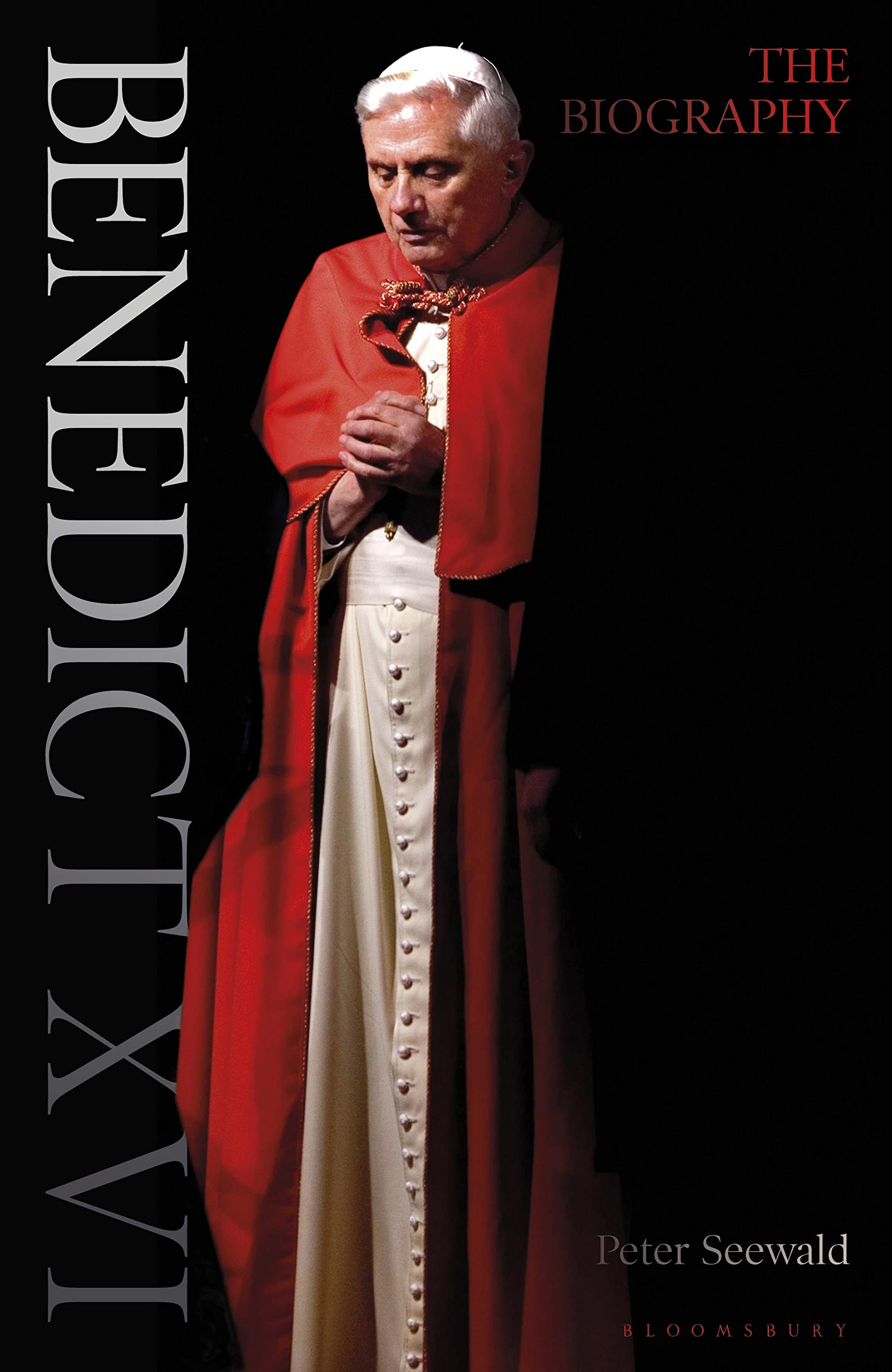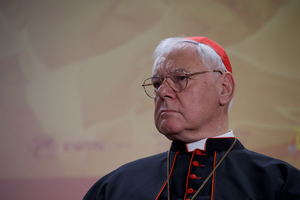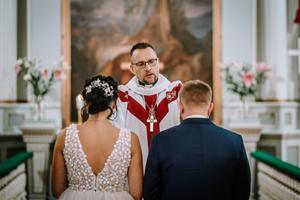Peter Seewald’s ‘Spiritual and Historical Journey’ With the Pope Emeritus
The German journalist discusses Benedict XVI: The Biography

In writing his definitive and monumental new work on Benedict XVI, biographer Peter Seewald discovered “countless” new elements to the pope emeritus’ life and character, including that his role in the Second Vatican Council was “not marginal but enormously significant.”
In this May 21 email interview with the Register, Seewald explains how the book, Benedict XVI: The Biography — running 1,184 pages in the German version — juxtaposes Joseph Ratzinger’s life and teaching with the dramatic and stirring events of the 20th century.
He also explains the genesis of the book, as well as Benedict’s relationship with Francis, the advice Benedict offers for dealing with the crisis of faith in the Church and the world today, and why Benedict decided to write a spiritual testament to be published after his death. Seewald also provides an update on how Benedict is faring during this time of pandemic.
The English edition of the first volume of Benedict XVI: The Biography will be published in November by Bloomsbury Continuum.

Why did you decide to write this book? How did it come about?
I sort of saw it as my job. Admittedly, there is now a wealth of books about Benedict XVI, such as the meritorious work of the Italian theologian Elio Guerriero. But there was none that showed Ratzinger’s biography and his teaching in connection with historical events, and that, above all, tries to tell the life, work and person of the German Pope in such an exciting way, as it corresponds to this life, in all its drama and its importance for the history of the Church and the world. To this end, I carried out extensive research, analyzed archives and conducted conversations with about 100 contemporary witnesses. Last but not least, Pope Benedict made himself available to me for this project in countless meetings. It is not only about the past, but also about the future. Cardinal Gerhard Müller, the former prefect of the Congregation for the Doctrine of the Faith, therefore called my book a “brilliant pitch,” which connects the path of a scholar with the core question of what is important in the Church of today.
The book contains many new interviews with the Pope Emeritus. When did these take place?
I began them during the year 2012, when Pope Benedict was still in office. We continued the interviews until 2018, most recently in his small monastery in the Vatican Gardens.
You’ve known Benedict for many years, but when you wrote this book and from the interviews you had with the pope emeritus, what did you learn about him that you did not know before?
Oh, countless things. The life of Joseph Ratzinger is the biography of a century.
One had always thought that the rise of the former professor of theology was one smooth progression, a career without any breaks. But there are countless ups and downs, with dramas that led to the brink of failure. There were the experiences during the Nazi era, when it was said that after the “Final Victory” [of the Nazis], Catholic priests would either be banned or end up in concentration camps. As a student, he had fallen in love with a girl — a story that made his decision to enter priestly life an existential one. A critical essay almost cost him an appointment to a faculty chair at the end of the 1950s. In Bonn, on the other hand, he was feted as a new star of theology and, at the same time, considered to perhaps be a dangerous modernist or even a Freemason.
His proximity to uncomfortable, independent-thinking personalities is striking. I was also unaware that Ratzinger’s role in the [Second Vatican] Council is not marginal but enormously significant. He himself always played it down. But alongside Cardinal [Josef] Frings, he was basically the definitive Vatican spin doctor. Pure legend, however, is the story of his “trauma” during the student revolt in Tübingen [in 1968], or the story of his turn from revolutionary to reactionary brakeman. I have examined all these things thoroughly, including the so-called scandals, such as the [former Society of St. Pius X bishop Richard] Williamson affair or “Vatileaks,” and come to quite different conclusions than those [voices] who merely reiterate stereotypes.
Ratzinger is not without fault. Nor did he get everything right when he was pontiff. But it is not by accident that he is considered worldwide as one of the great thinkers of our time. His work is important, and his life exciting, so it is always worthwhile to study him. In addition, the biography, with its contemporary historical background, is not only a spiritual and historical journey through an exciting and dramatic century; it also shows the lessons to be drawn from all those decades and the cutting-edge answers these provide to the current faith and Church crisis in the West.
According to what we already know from the contents of your book, Benedict says that modern society is in the process of “socially excommunicating” those who disagree with abortion or the same-sex agenda that he attributes to the spirit of the Antichrist. What does he advise believers to do in the face of these threats?
Pray and work. Just stand firm. Do not be infected by relativism, and do not despair — for, in the end, Christ will always be the victor. Society is dependent on the streams that nourish it through religion. We see from the cruel experiences of the 20th century what would be threatened if the Christian worldview and Christian ethics were to be completely banned from public debate.
At the same time, Ratzinger never had any illusions about the fundamental contradiction between secular society and the thought and life of Christians. He saw early on the situation of a diminishing community of faith coming closer. In his 1958 work The New Pagans and the Church, he says: “In the long run, the Church cannot avoid the need to get rid of, part by part, the appearance of her identity with the world and once again to become what she is: the community of the faithful.” Ratzinger saw in God's “path of salvation” a Church of the minority. That means a church of relatively few confessions, who are then charged with representing the many. Only when the Church ceases to be “a cheap, foregone conclusion, only when she begins again to show herself as she really is,” he admonished, “will she be able to again reach the ear of the new Gentiles with her message.”
You mention that Benedict has written a spiritual testament to be published after his death. Why did he feel the need to write it, and do you have a general idea of what it might contain?
At first, the pope emeritus did not want to write a spiritual testament, but he has now come to think differently about it. I think that Benedict XVI wants to serve his Church and society once again with words that go beyond time. There is a good tradition in these posthumous papal texts. We think of the beautiful testament of Paul VI. I am not a clairvoyant, but I can imagine that in Benedict’s paper he expresses concern for the future of the faith, but at the same time helps to strengthen people in troubled times, and not only the faithful.
You mention that relations between Benedict and Pope Francis are good, but there are some Catholics who wish that Benedict had not resigned, who contend that he would never agree with some of the decisions of this pontificate. What do you say to this view?
The former and the current pope have different temperaments, different charismas, and they each have their own way of exercising the office. We see from the popes of previous centuries that a more intellectual pontiff is usually followed by a more emotional one. That was never a disadvantage. Undoubtedly, there can be different views between Benedict XVI and Pope Francis. But that does not matter. The pope is the pope.
Ratzinger promised obedience to his successor before he even knew who would follow in his footsteps, and he has been scrupulously careful all these years to first of all ensure that no accusation of interference could arise. Many of the later questions I asked him, for example, he refused to answer. One answer, he said, would “inevitably constitute interference in the work of the present Pope. Anything that goes in that direction I must, and wish to, avoid.” Moreover, in my book he literally says: “The personal friendship with Pope Francis has not only remained, but has grown.”
Catholics who are disappointed with the current pontificate argue that Benedict remains pope. Is this question addressed in the book, and perhaps the concerns these people have that he seems to be promoting the image of “two popes” by retaining some of the trappings of the papacy?
As I said before, the pope is the pope. There is no other pope besides him, at least not in our time.
Talk of Ratzinger as a “shadow pope” is as nonsensical as the fairy tale that Bergoglio is hounded by the “wolves” in the Vatican. As the first really reigning pope in history who resigned his office, Ratzinger had to establish a new tradition in the Catholic Church, so to speak. Nobody knew what a resigned pope should call himself, how he should dress and which things he should or should not do after his resignation.
On the one hand, Benedict XVI is emeritus, as there are emeritus bishops; but on the other hand, as a former pope, he is different from ordinary bishops. This includes the fact that he removed the insignia of a reigning pope, but continues to wear white. I do not believe that people are so simple-minded that they do not know who is the incumbent pope and who is not. If Francis also resigns and Benedict XVI is still alive, there will even be three living popes, but only one who sits as vicarius Christi on the chair of Peter.
Does the book offer a more complete picture of Benedict’s reasons for his resignation, and if so, how?
The complete circumstances of his resignation are explained in detail in my biography. In addition, Benedict XVI once again takes a clear position on this. I think that with it, really, all has been said. Basically, this is also a very simple story. It only seems so mysterious because certain people don’t get tired of always spinning some secrets.
Anyway, the whole act was a resignation with an announcement. It had nothing to do with “Vatileaks,” as is still claimed, nor with blackmail or anything else. Like the popes before him, Benedict XVI, soon after his election, had signed a resignation declaration in case he could no longer exercise his office due to a serious illness, such as dementia. In our interview book Light of the World, he already explained in 2010 that a pope not only has the right but sometimes also the duty to resign from office if he is physically and/or psychologically no longer able to really exercise it. John Paul II is a special case here. He had a charism of his own, and his ordeal, which was necessary to bring new strength to the Church, cannot be repeated. In the last years of Wojtyla’s life, however, a vacuum was created, which was not without problems.
Benedict XVI saw for himself another vocation. He was no longer a young man when he was elected into office. In the many decades before [his election] he also never spared himself, fighting as a front-line defender of the faith. During his pontificate, which lasted, after all, eight years, he had completely exhausted himself. The fact that he, at his old age and with health handicaps, of which the public had no idea, then also wrote a trilogy on Jesus almost bordered on the superhuman.
In the end, he was powerless and saw the necessity of giving the shepherd’s crozier to younger, fresher hands. Above all, he did not want to deprive his potential successor of the chance of starting his office with the thrust of the World Youth Day of Rio de Janeiro, as he himself began his pontificate with World Youth Day in Cologne.
Benedict XVI knew what he was getting into with his act of resignation. He thought through this step for many months and suffered through it in prayer. One can believe him when he says that he is at peace with it, especially with his Lord, to whom alone he is ultimately responsible.
Critics might say that the book is another breach of the oath that he swore to himself to remain hidden from the world, in silent prayer. Why do you think he agreed to speak not only in this book, but also already in the Last Testament and in sporadic statements and essays?
Stop — my biography is not Pope Benedict’s publication, but the work of a journalist. And Last Testament contains interviews that had already begun in 2012 within the framework of my work for the biography — that is, still during the pontificate of Benedict XVI. Ratzinger originally did not want them to be published in a separate work. But I was able to convince him to publish the work when speculation about his resignation would not be silenced. However, he made the publication of the book dependent on the approval of Pope Francis, who also gave it willingly. Moreover, Benedict did not take a vow of silence when he resigned. His last words as acting pontiff were: “I wish to continue to work, with my heart, with my love, with my prayer, with my thoughts, with all my spiritual forces, for the common good, for the good of the Church and of humanity.”
How is Benedict doing these days, especially these days of quarantine? Are you in regular contact with him?
Since the outbreak of the coronavirus pandemic, his “Mater Ecclesiae” residence has been subject to the general regulations for Italy. This meant for the first time: Nobody goes out; nobody comes in. Physically, the pope emeritus is now very frail. His voice has become so weak that one can hardly understand him. Mentally, however, he is still fit. He still carries out an extensive correspondence, and his letters are, as always, intellectually stimulating and refined. I only see him occasionally.
Pope Benedict has answered all sorts of questions from me over the years, and, of course, I still have some questions that I would like to ask. But at some stage, it’s enough. I am glad that the many encounters were possible and look with gratitude on our interviews, which help to correct misconceptions of Benedict XVI and give many people the opportunity to penetrate more deeply into the Christian faith through the life and work of Joseph Ratzinger, or to discover Christ in a completely new way.
Edward Pentin is the Register’s Rome correspondent.


















